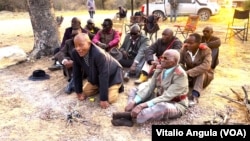The Namibian government is welcoming back nearly 100 Batswana of Herero descent to their ancestral land, marking a significant moment in the ongoing process of restorative justice for the descendants of those who fled German South West Africa — now Namibia — during the 1904-1908 genocide.
Fleeing German aggression, many sought refuge in then Bechuanaland — what's now known as Botswana. As part of this effort, Namibia has made five commercial farms available for their resettlement, a step toward reconciliation and healing.
John Kandjii and other elders of his clan have gathered at the Dobe Border Post, a transit area for immigration between Botswana and Namibia. His role today is the lighting of the "Holy Fire," where he calls upon the elders who have already departed the earthly realm to guide and protect them at this significant occasion which marks the return of the descendants of the Ovaherero who fled their ancestral land more than 120 years ago.
"They were one — I am sure that they were one at that time — but now we are having borders, there is a difference," said Kandjii. "This is a different country; Namibia is alone, but communication they are together, those countries … you understand what I am saying."
Kandjii explained to VOA how the formation of the Nation State and the Berlin Conference separated the Ovaherero from each other which could have been a good thing because the Ovaherero from Namibia had somewhere to flee to during the 1904-1908 genocide which decreased their population by an estimated 80%.
Although Namibia was prepared to receive 98 returnees, only 50 crossed the border on Friday. Some are still waiting for the quarantine clearance for their livestock before they can cross the border.
James Uerikua is the governor of the region where the returnees were received and where some will be relocated.
"They will be settled in Otjozondjupa region, in Omaheke region and in the Hardap region because the government of the Republic of Namibia in preparation to receiving you brothers and sisters efforts were made at high level and a reception area was created at Gam measuring about 20 hectares," he said.
The 20 hectares at Gam will be treated as a transit camp for returnees to adapt to life in Namibia before moving to the commercial farms they have been allocated by the government.
At the settlement in Gam, the returnees will be issued hospital cards and proper identification documents. Their children will be placed into Namibian schools.
Officials have promised that potable water, sewage and electricity will be available in Gam as soon as possible.
Elizabet Cherneff contributed to thes story.




